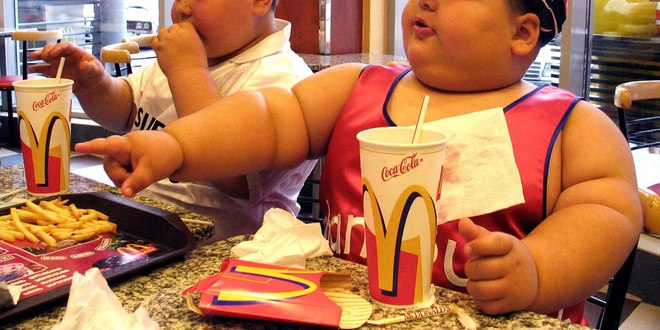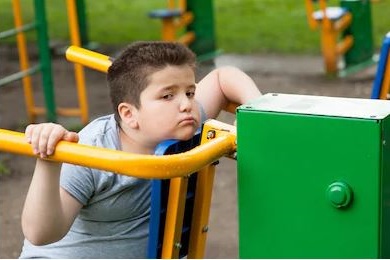
Nobody likes being fat and specially when you’re living the early years of your life, you hate being teased or looked down because of your bulky body.
So, what is childhood obesity?
Childhood obesity is the one of the most common reasons that negatively affects a child’s health and well-being. More than the physical health, it affects a child’s mental and emotional well-being.
As a consequence, the child starts feeling under confident, inferior and not up to the pseudo standards of the society. There can be a variety of reasons for obesity among kids.
More often than not, childhood obesity is caused by genetic factors, absence of physical activity, junk overdose, unhealthy lifestyle and sleeping patterns, or a combination of these factors. Only in exceptional cases childhood obesity caused by a medical condition such as a hormonal imbalance.
Genetic issues and addiction to junk food top the list of the causes of obesity in children.
Nowadays, food brands are doing aggressive marketing to promote their stuff among the kids. From TV advertisements to print ads, every brand is trying to capture the kids’ mind.
Due to easy availability of junk and lack of physical regime, childhood obesity is becoming a common concern these days across the globe. It is a serious medical condition that affects children and adolescents with varying degrees of body fat.
How to know if you have more fat
The diagnosis of obesity is done on the basis of BMI Index, as it is difficult to determine the body fat directly.
The Body Mass Index (BMI) is used for determining obesity for children two years of age and older through the ratio of weight to height. The normal range of BMI in children vary with their age, sex and body type. However, a body with BMI of more than 85 percentile is considered overweight and BMI equal or greater to 95 percentile is considered obese according to the general health and weight standards.
Obesity first starts affecting a child psychologically. They’re usually harassed, bullied or discriminated by their peers and even own family members. Many children end up having a low self-esteem and depression due to this.
On the physical front, Childhood obesity can result in life-threatening conditions like diabetes, high blood pressure, heart disease, sleep problems, cancer, and other disorders. Obesity in childhood might also lead to other health issues that include liver disease, early puberty or menarche, eating infirmities such as anorexia, certain sort of skin infections, asthma and respiratory issues.
In initial stages, obesity in adolescence results in child’s organs being affected, gallstones, hepatitis, sleep apnoea and rising intracranial pressure. More often than not, overweight children grow up to become overweight adults. Obesity during adolescence has been found to increase mortality rates during adulthood. Therefore, it is more than essential to combat this issue at the right time and prevent the further damage to both mental and physical well-being of an individual.
Now, let us understand how can we prevent obesity right from the childhood, thereby safeguarding the child from future health issues. Following are some of the ways childhood obesity prevention and dealing with childhood obesity.
- Encourage healthy eating habits among the kids.
- Prepare your child’s favorite dishes in a healthier way.
- Remove the calorie-rich options from their diet.
- Set a routine for your kid that includes some sort of physical activity.
- Help your kids understand the importance of eating and sleeping on time.
- Reduce their sedentary time and help them stay more active.
Most importantly, as a parent or a care taker, set a good example for your kid. Intentionally or unintentionally, kids look up to their care takers and end up developing the same habits.
So, to encourage your kid to have a healthy routine, you yourself need to incorporate a healthy lifestyle first. Sit with your kid and eat the healthy food with them. Take them out for a physical activity on a daily basis in which you and your kid both participate actively.
Set a time to sleep for the whole family because no matter what you plan, till the time you do it yourself and set an example for the kids, they won’t do it.
You can choose a different physical activity for everyday so that your kid stays interested in going out. Some of the examples of moderate-intensity physical activity are swimming, dancing, brisk walk, rope jumping, playing soccer, playing tag etc.
Make your kid understand the advantages and importance of staying physically active. Educate them about the great health benefits of including physical activity in their daily routine. Strengthening of bones, doing away stress and anxiety, decreasing blood pressure, boosting self-esteem, helping with weight management etc. are some of the benefits of having a physically active lifestyle.
Other than that, limit their TV/Screen Time to no more than 2 hours in a day. Sitting in front of the screen whole day makes you lazy and obese, therefore, it’s important to reduce the screen time of your kid.
Substituting calorie-rich food with healthier food is an important step in weight reduction and management, however, don’t put your child on a weight-reduction diet without speaking to your health care provider. Every kid has a different body type and what suits one might not suit the others. Also, certain types of proteins, fats and vitamins are necessary for the kids to take for the overall development and functioning of their body. Therefore, it is best to consult a health care provider or kids’ nutritionist regarding the diet that should be followed.
Childhood obesity has become a serious health crisis in America. According to the Centres for Disease Control and Prevention(CDC), as of 2012, 18% of children aged between 6 to 11 years and 21% of adolescents aged between 12 to 19 years are considered obese. Two of the main contributing factors are severe caloric imbalance and absence of physical activity in their routine.
It is extremely crucial to fight and prevent this issue at the right age and time so that it doesn’t turn into a serious medical condition later in life. Tackling this issue right in the childhood will save you from developing diseases in the later run of your life.
Eat healthy, live healthy!




Leave a Reply